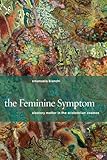The Feminine Symptom : Aleatory Matter in the Aristotelian Cosmos / Emanuela Bianchi.
Material type: TextPublisher: New York, NY : Fordham University Press, [2014]Copyright date: ©2014Description: 1 online resource (336 p.)Content type:
TextPublisher: New York, NY : Fordham University Press, [2014]Copyright date: ©2014Description: 1 online resource (336 p.)Content type: - 9780823262199
- 9780823262212
- 185 23
- online - DeGruyter
| Item type | Current library | Call number | URL | Status | Notes | Barcode | |
|---|---|---|---|---|---|---|---|
 eBook
eBook
|
Biblioteca "Angelicum" Pont. Univ. S.Tommaso d'Aquino Nuvola online | online - DeGruyter (Browse shelf(Opens below)) | Online access | Not for loan (Accesso limitato) | Accesso per gli utenti autorizzati / Access for authorized users | (dgr)9780823262212 |
Frontmatter -- contents -- acknowledgments -- Introduction -- chapter one. Aristotelian Causation, Reproduction, and Accident and Chance -- chapter two. Necessity and Automaton -- chapter three. The Errant Feminine in Plato’s Timaeus -- chapter four. The Physics of Sexual Difference in Aristotle and Irigaray -- chapter five. Motion and Gender in the Aristotelian Cosmos -- chapter six. Sexual Difference in Potentiality and Actuality -- Coda: Matters Arising -- notes -- bibliography -- index
restricted access online access with authorization star
http://purl.org/coar/access_right/c_16ec
The first English-language study of Aristotle’s natural philosophy from a continental perspective, the Feminine Symptom takes as its starting point the problem of female offspring. If form is transmitted by the male and the female provides only matter, how is a female child produced? Aristotle answers that there must be some fault or misstep in the process.This inexplicable but necessary coincidence—sumptoma in Greek—defines the feminine symptom. Departing from the standard associations of male-activity-form and female-passivity-matter, Bianchi traces the operation of chance and spontaneity throughout Aristotle’s biology, physics, cosmology, and metaphysics and argues that it is not passive but aleatory matter— unpredictable, ungovernable, and acting against nature and teleology—that he continually allies with the feminine.Aristotle’s pervasive disparagement of the female as a mild form of monstrosity thus works to shore up his polemic against the aleatory and to consolidate patriarchal teleology in the face of atomism and Empedocleanism.Bianchi concludes by connecting her analysis to recent biological and materialist political thinking, and makes the case for a new, antiessentialist politics of aleatory feminism.
Mode of access: Internet via World Wide Web.
In English.
Description based on online resource; title from PDF title page (publisher's Web site, viewed 03. Jan 2023)


